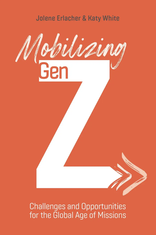“It breaks my heart to see friends step away from the faith, but I know that they will not be dragged back forcefully, so I just try to love them and show my faith through my action toward them.” I don’t want to pick on Gen Z here - this is a sentiment that I hear from every generation. Inevitable, Francis of Assisi will be misquoted, “Preach the gospel at all times. If necessary, use words.” It’s an interesting misattribution seeing that Francis is recorded as preaching sermons not only to people, but to the birds and animals as well. It creates a false dichotomy, pitting one aspect of the Christian work of sharing the gospel with another. It’s never words versus deeds. It is always words and deeds. It is an interesting idea to consider though - the idea that if we just love really well and serve others well, those people will want to know about our faith in Christ. But here is a question to ask yourself: Do you have friends who are not Christians? Are they Atheists, Muslims, Hindus or others? Are some of them not loving, helpful people? The type of people who would give you the shirt off their back if you needed it? I have lots of friends like that - some much more service minded than I am - and never once have I thought to myself, “Man, they are really nice. I think I want to learn more about their beliefs about God and maybe become whatever faith they are.” Why do we think our friends will respond any differently? Being nice is not the gospel, it’s part of being human. Everyone can do it and does. When we look back at Jesus and the apostles, at the early church, at Francis of Assisi, they weren’t just nice, helpful people. They were recklessly generous with their money and time and words. Jesus’ three years of ministry were filled with the disruption of broken and sinful people barging into his day with requests for healing and help. He doesn’t seem to have been good at setting healthy boundaries. The first Christians regularly sold their possessions to give to the poor, cared for the sick when others dumped them in the streets and reconciled Jew and Greek, slave and free, male and female into one body, the Body of Christ. Read any good biography of St. Francis and you’ll quickly realize that he wasn’t just nice and helpful - he was bonkers for Christ and gave everything, in word and in deed, to serve his King. Michael Frost, in his book “Surprise the World” suggests that the kind of life that actually catches people’s attention is what he calls ‘questionable lives’. These are the lives of Jesus and the apostles, the first century believers and believers, like Francis, all through history. Frost suggests that “our challenge is to find what similarly questionable lives look like in the twenty-first century.” So, as we interact with those who don’t believe, if we are going to “just try to love them and show our faith through our actions toward them” we may need to pray about what it looks like to have our love and actions become questionable in their eyes. Being a normal, good person is not enough. Yes, we should serve others through our love and actions, but Paul tells us that “faith comes from what is heard, and what is heard comes through the message about Christ” (Romans 10:17). He later shares in 1 Corinthians 3:6-7 that, “I planted, Apollos watered, but God gave the growth. So, then, neither the one who plants nor the one who waters is anything, but only God who gives the growth.” God will do the work but he uses our words as the kindling to start the fires of conversion. This is the example of the Bible. Jesus, and the disciples who followed him down through the ages, all did good deeds for others but they always spoke. They preached. They called people to repentance and to the truth that Jesus is King of Kings and Lord of Lords, the ultimate reality in the cosmos and the only true way to eternal life. If we are hesitant to share the gospel, we may want to reflect on whether that hesitancy comes from our discipleship under the word of God or if it’s more a reflection of our culture. The reality is that even talking about sharing our faith as a two part process of words and deeds would probably be a foreign concept to the disciples and early Christians and people like Francis. Jesus saved our whole life and our whole life serves him. So of course we should serve and love and help others. Because Christ lives in us we can do nothing but be the most service orientated and loving and helpful people around. And of course we should take every opportunity to share the good news of Christ - whether we know a person or not, whether we’ve loved and served them or not. Their eternal destiny depends on the seed of the gospel being planted in their heart and that won’t happen if no one shares with them. The number one complaint I hear from former Muslims who came to faith after moving to America is, “Why didn’t anyone tell me sooner?” So as you consider how to live out the fullness of a word and deed gospel message, I’ll end with this – whatever you do, in word or in deed, do everything in the name of the Lord Jesus, giving thanks to God the Father through him (Col. 3:17). If you found this article helpful, share it with others.
0 Comments
|
The E2E Community
Categories
All
Good Books
Archives
April 2024
|
Proudly powered by Weebly






